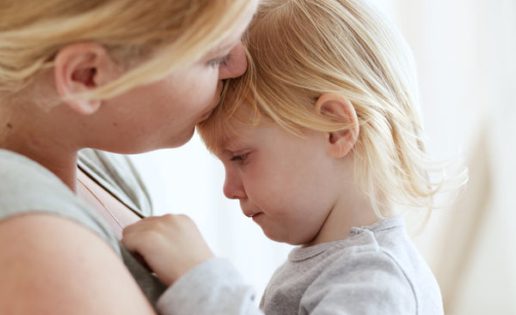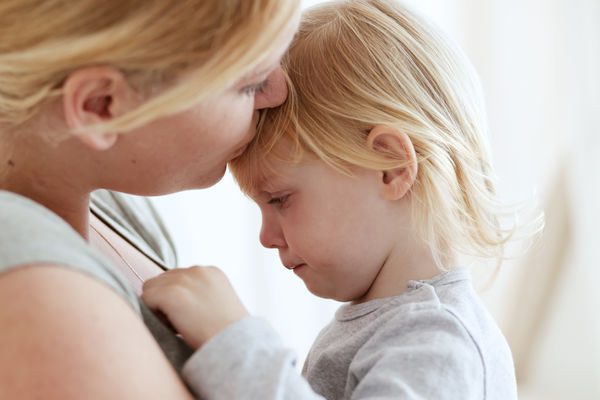State the facts. Say, “Grammy got very sick in her lungs and heart. She was having trouble breathing. The doctors did their best to help her get well, but she died,” or, “Aunt Maria died. She had a sickness called cancer (or was in a car accident, etc.) and her body got worn out/injured from that even though she was young.” You can also say, “When someone dies, it means they cannot talk or play anymore. We can’t see them or hug them again. Dying means their body stopped working.”
Give short, simple explanations and then pause. After your statement, wait to see if your child has more questions. Go at their speed. They will ask you another when they are ready. If you provide more information than they asked for, they may get more worried or confused.
Keep answering questions. You may find that children’s questions come in spurts over several days or weeks as they try to make sense of what happened. Here are some common toddler questions about death and some sample answers:
- Where is Grammy now? Toddlers can be confused by vague language like: “Grammy went to a better place” or “Aunt Maria passed away.” A young child may believe that the person is literally in another place or be confused by the word “passed.” Sometimes death is described as “going home” or “eternal sleep.” Toddlers may start to fear normal activities, like going home after an outing or falling asleep. Instead offer a simple, age-appropriate explanation that reflects your personal beliefs.
- Will you die? Recognize their fear but then offer reassurance. Say, “I can see why you are worried about that, but I am strong and healthy. I will be here to take care of you for a very long time.” If someone young died suddenly, this may take longer to work through as it can bring up a lot of fear. Be patient. It’s OK to admit that it’s hard to understand why bad things happen.
- Will I die? Get cancer? Have a car accident? Remind them of all they do to stay healthy and safe. Say, “We eat right, sleep right, and go to the doctor so you can stay healthy and live for a long, long time.” Or, “We wear seatbelts in the car and follow the rules of the road to avoid accidents as much as we can.”
- Does everyone die? Tell the truth. Say, “Eventually, everyone dies. Most people die when they are very old like Grammy.” Or, “Sometimes terrible things happen and it’s very sad and scary when people die suddenly. It’s OK to be scared and sad. I’m right here with you.”
- What if I get sick or hurt? Acknowledge that everyone gets sick and hurt sometimes. Say, “Getting sick or hurt doesn’t mean you will die. If you get sick or hurt, we will take care of you. We’ll take you to the doctor if needed.”
- Can I die so I can be with Grammy/Aunt Maria? This question comes from a place of missing their loved one. It doesn’t mean your child actually wants to die. Stay calm and say, “I understand that you want to be with Grammy/Aunt Maria. I miss her too. When someone dies, they can’t play with blocks, or eat ice cream, or go on the swings anymore. She would want you to do all those things and I do too.”
- What is dying? Keep in mind that young children are not capable of fully understanding death. Grown-ups struggle with that too! It can help to offer a simple, concrete explanation. Say, “Aunt Maria’s body stopped working. She couldn’t eat, or play, or move her body anymore.”
You may see behavior changes after the loss. Even if children don’t fully understand death, they do know that something important and lasting has happened. Your toddler may have intense tantrums or be very clingy. Children may also show changes in sleeping or toileting patterns. These changes are usually temporary and diminish over time when you respond with kindness, patience, and some extra love and attention.
Parents may notice toddlers playing “dying” games. Your child might pretend to play where a toy train or stuffed animal gets sick or hurt and “dies.” This is very normal. Children show us through their play what they are thinking about. You can consider adding a doctor’s kit or ambulance to your child’s choices. Feel free to join in their play as long as you let them take the lead. Over time, this focus will fade.
Young children may ask the same questions over and over. It might be hard to keep answering the same questions about the death of a loved one. But this is an important way your toddler grasps what has happened. Young children learn through repetition so hearing the same details over and over helps them make sense of the experience.
It’s OK to talk about and remember your family member with your child. Say, “Let’s make Grammy’s favorite muffins this morning. We can remember her while we bake together.” Or, “Aunt Maria always loved tulips, let’s plant some tulips and remember her every time we see tulips.” You can also share photos or sing favorite songs.
It’s OK to cry in front of your child, though it is important to explain why. Say, “I am crying because I am sad that Grammy/Aunt Maria died. I miss her.” If your grief becomes overwhelming, you deserve support. If your child’s grief is intense, persistent, or interferes with their play or learning, they may need support too. Ask your HealthySteps Specialist for suggested resources.
Copyright © 2020 ZERO TO THREE. Use is expressly limited to Programs approved by the HealthySteps™ National Office (Program) and which are a part of the HealthySteps™ National Network for the sole purpose of reproduction and dissemination to parents for the parent’s personal use only. Adaptations, reproductions, revisions, excerpts, derivatives including but not limited to translations, and other exploitation of the materials are expressly forbidden without the prior written authorization of ZERO TO THREE.


